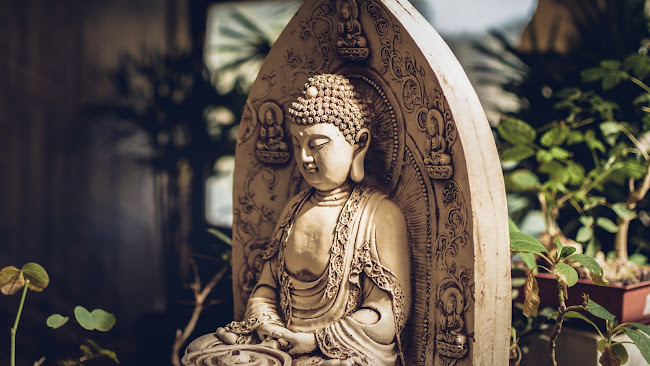Buddha's Descent Explained by Gabriel Weiss
On November 15th many Buddhists around the world, particularly within Tibetan and Bhutanese traditions, celebrated LhaBab Duchen, a mythical experience of Buddha's descent from a heavenly realm. What's that all about?
So one version of the story goes, Buddha's mother passed away soon after Buddha's birth (at that time his name was Siddhartha), and so about 40 years later, sometime after Siddhartha had awakened or attained enlightenment becoming a Buddha (Buddha basically means "awakened one"), he decided he wanted to repay his mother's kind-ness, (you know, for carrying him for 9 months and giving him life). So Buddha ascended to the heavenly realm where she was residing and there offered teachings for a month or so, positively blowing everyone's mind!
Buddhism is a karmic religion, it is believed that all beings continually reincarnate after death, leading successive lives, the context of which is largely determined by one's actions and mental-emotional propensities in their present life. It is then said that there are six types of realms of incarnation, realms for blissful gods, for jealous gods, a human realm, animal realm, a realm of hungry ghosts, and then the hell realms! These realms are not considered hier-archical, rather they are depicted like a wheel, so while anyone would prefer the blissful god realm to that of a hungry ghost, ultimately none of these represent permanent states and one can end up migrating from one realm to any other, an ongoing cycle. A Buddha is one who has gained liberation from that cycle, no longer driven by afflic-tive emotions like desire and hatred, like being caught in a dream beyond one's control. A Buddha is one who has awakened within the dream and mastered it.
Anyway, when Buddha wrapped up his amazing teaching retreat in heaven, he proceeded to descend through all the realms and the light of his countenance and wisdom pervaded all these realms. For at least a moment, the veils between all realms were dissolved, and all the limitless beings of manifold worlds were able to perceive each other, and they each caught a glimpse of Buddha, which is to say that they caught a glimpse of their own true nature. This was like a seed planted in their hearts, an aspiration for enlightenment or awakening to that essential nature shared by all beings. That's one take anyway. Evidently many of us Buddhists consider this a good cause for remembrance
and celebration!



Comments
Post a Comment